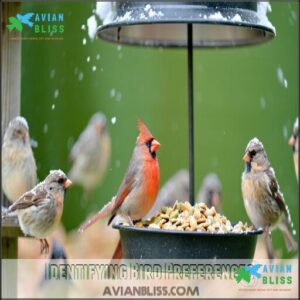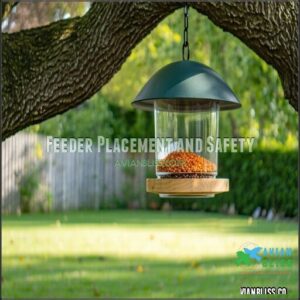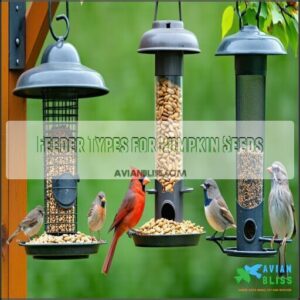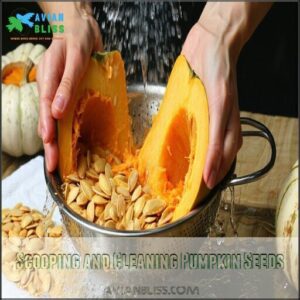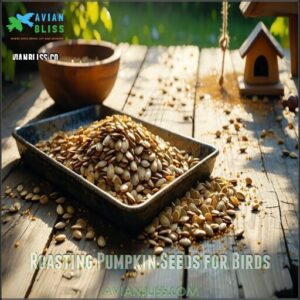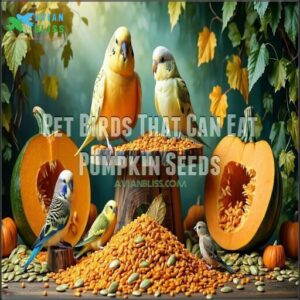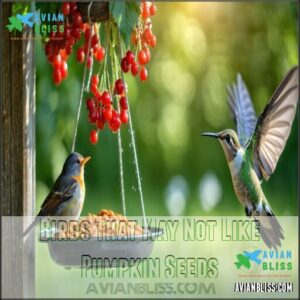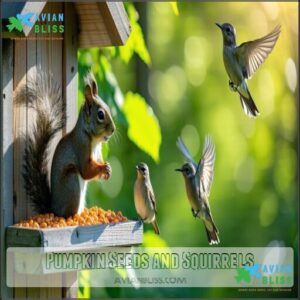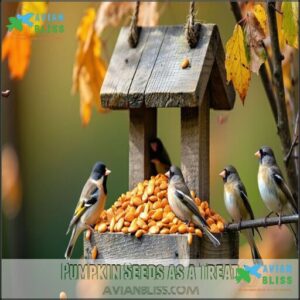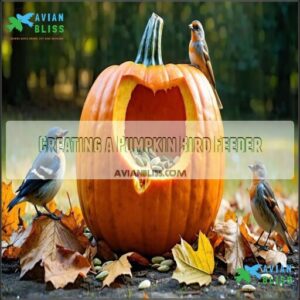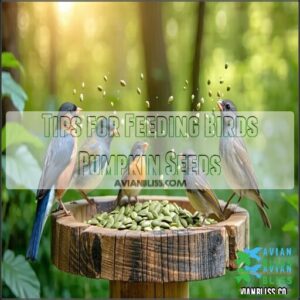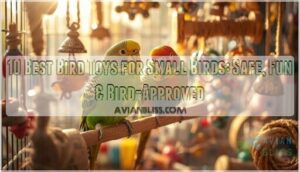This site is supported by our readers. We may earn a commission, at no cost to you, if you purchase through links.
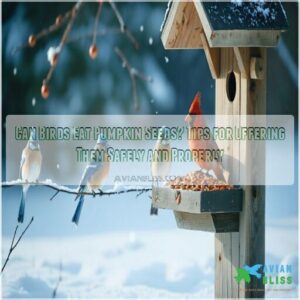 Yes, birds can eat pumpkin seeds! These nutritional powerhouses are packed with protein, healthy fats, and minerals that benefit your feathered friends.
Yes, birds can eat pumpkin seeds! These nutritional powerhouses are packed with protein, healthy fats, and minerals that benefit your feathered friends.
You’ll want to serve them unsalted and either raw or lightly roasted. For smaller birds, consider crushing the seeds slightly to make them easier to eat.
Many backyard visitors like cardinals, blue jays, and chickadees will flock to pumpkin seeds like kids to an ice cream truck. If you’re clearing out your Halloween pumpkin, don’t toss those seeds—they’re bird gold.
The right preparation method can turn this seasonal treat into a year-round feeding option for your backyard birds, making pumpkin seeds a valuable resource, and providing a year-round feeding option.
Table Of Contents
- Key Takeaways
- Can Birds Eat Pumpkin Seeds?
- Choosing The Right Feeder for Pumpkin Seeds
- What Birds Can Eat Pumpkin Seeds?
- Pumpkin Seeds and Squirrels
- Storing and Preserving Pumpkin Seeds
- Pumpkin Seeds as a Treat
- Creating a Pumpkin Bird Feeder
- Tips for Feeding Birds Pumpkin Seeds
- Frequently Asked Questions (FAQs)
- Can birds eat pumpkin seeds?
- Can pigeons eat pumpkin seeds?
- Can cockatiels eat pumpkin seeds?
- Can you put pumpkin seeds in a bird feeder?
- Do chickadees eat pumpkin seeds?
- Do great tit eat pumpkin seeds?
- Are raw pumpkin seeds ok for birds?
- How do you prepare pumpkin seeds for birds?
- What seeds should birds not eat?
- Why do birds eat pumpkins?
- Conclusion
Key Takeaways
- You can safely feed pumpkin seeds to birds, as they’re packed with protein, healthy fats, and minerals that support their energy needs and feather health.
- You’ll want to serve pumpkin seeds unsalted and either raw or lightly roasted at 300°F for 45 minutes, with smaller seeds crushed for tiny birds.
- You should use platform or hopper feeders for pumpkin seeds, keeping them dry and accessible while placing feeders 5-10 feet high to protect birds from predators.
- You’ll find cardinals, blue jays, chickadees, and many pet birds enjoy pumpkin seeds, but limit them to about 15% of their diet for proper nutritional balance.
- You can safely feed pumpkin seeds to birds, as they’re packed with protein, healthy fats, and minerals that support their energy needs and feather health.
- You’ll want to serve pumpkin seeds unsalted and either raw or lightly roasted at 300°F for 45 minutes, with smaller seeds crushed for tiny birds.
- You should use platform or hopper feeders for pumpkin seeds, keeping them dry and accessible while placing feeders 5-10 feet high to protect birds from predators.
- You’ll find cardinals, blue jays, chickadees, and many pet birds enjoy pumpkin seeds, but limit them to about 15% of their diet for proper nutritional balance.
Can Birds Eat Pumpkin Seeds?

Yes, birds can eat pumpkin seeds, and they’re actually quite nutritious for them.
These seeds provide essential nutrients like protein, healthy fats, and minerals to support their energy and overall health.
Nutritional Benefits of Pumpkin Seeds
Pumpkin seeds pack a punch in the context of bird nutrition! They’re a delicious way to boost bird health, especially during migration or winter preparation.
Here’s why they’re a must-have in your feathered friends’ diets:
- Protein Content: These seeds are an excellent energy source, helping birds stay active and thrive.
- Seed Minerals: Packed with calcium, magnesium, and phosphorus, they support bone strength and overall bird health.
- Healthy Fats: These fats keep birds warm in cold weather, promoting feather health and insulation.
- Fiber: Pumpkin seeds aid digestion, keeping systems running smoothly.
Adding these seeds to a bird’s diet guarantees essential nutritional benefits while giving them the extra energy they need.
Preparing Pumpkin Seeds for Birds
Getting pumpkin seeds ready for birds is simple and safe.
First, wash off any leftover pulp under clean water. You can dry the seeds using low-cost drying techniques, like air-drying, or roast them gently at 200°F to protect nutrients. Skip the salt, spices, or any additives—birds prefer their treats plain!
- Rinse seeds thoroughly to remove debris.
- Use roasting methods at low heat to preserve nutrients.
- Skip additives like flavoring to guarantee safety.
- Hull larger seeds for smaller birds or grind for easier eating.
Bird food preparation doesn’t need to be tricky!
Serving Pumpkin Seeds to Birds
Serving pumpkin seeds to birds is simple if you keep a few things in mind.
First, plain seeds without salt or seasoning are best for bird feeding.
Skip any additives—they don’t do birds any favors.
Try different serving methods to suit your feathered visitors.
Scatter seeds on the ground for ground-feeding species.
Use a tray feeder or mix pumpkin seeds with other bird treats for variety.
For smaller birds, hulling seeds or crushing them makes them easier to eat.
A hollowed-out pumpkin works as a natural feeder, adding charm to your backyard bird feeding setup.
Stick with clean, dry seeds to avoid mold.
Roasted seeds can be offered too, but roast them plain without oil or seasoning.
Rotate these seeds with other foods to guarantee a balanced diet, so everyone stays healthy and happy.
Choosing The Right Feeder for Pumpkin Seeds
You’ll want the right feeder to make eating pumpkin seeds easy for birds of all sizes. Choose a feeder that keeps the seeds dry and accessible while preventing messes.
Identifying Bird Preferences
To figure out bird preferences, watch how they feed. Each bird has its quirks! Strong-beaked birds, like cardinals, crack whole seeds quickly, while smaller species prefer hulling seeds or crushed seeds.
Seasonal preferences matter too—birds eat pumpkin seeds more during migrations or chilly winters when energy is a must.
Here’s how to fine-tune your backyard bird feeding:
- Match seed size to the bird species—smaller birds love chopped or ground seeds.
- Experiment with taste variations, like raw or lightly roasted pumpkin seeds (unsalted, of course).
- Observe which birds flock to a specific feeder.
- Use tray feeders for easy access.
- Adjust seed prep to preferred preparation for picky eaters.
Cardinals are attracted to safflower seeds, which may be a good alternative.
Feeder Placement and Safety
A bird feeder’s placement can make all the difference in bird feeding safety.
Keep it 5–10 feet high to guarantee proper feeder height and protect against predators like curious cats. Position the feeder in a quiet spot, sheltered from harsh weather but easy for birds to spot.
Use baffles to deter climbers like squirrels, and keep it away from windows to prevent injuries. Clean the feeder regularly to avoid moldy seeds and protect wild birds.
- Ideal height: 5–10 feet.
- Weather protection: Partially sheltered areas.
- Predator avoidance: Add baffles or guards.
- Seed spacing: Clean to prevent spoilage.
Feeder Types for Pumpkin Seeds
Hopper feeders and tray feeders are great for holding pumpkin seeds for birds, offering birds an easy and tidy way to grab food.
Platform feeders work well too, especially for larger species. Tube feeders can be handy but choose ones with wide openings to prevent clogs.
Mesh feeders let birds pick seeds without scattering them everywhere. For ground feeding, scatter seeds in open areas for birds like doves and cardinals.
Some people even purchase specialized seed dispensers for this purpose. If squirrels sneak in, go for squirrelproof bird feeders.
With these bird feeding tips, you’ll keep pumpkin seeds organized while attracting diverse feathered friends to your yard, and it’s a great way to enjoy pumpkin seeds and have a tidy feeding area.
Scooping and Cleaning Pumpkin Seeds
Scooping out pumpkin seeds is simple. Grab a sturdy spoon or your hands to pull seeds from the pumpkin.
For thorough seed separation, pick out any seeds hiding in the stringy pulp—it’s a bit messy but worth it! Rinse them under cold water to remove leftover pulp. You can use a soft brush for stubborn bits, ensuring cleaning safety.
Pat the seeds dry with a towel to prepare them as pumpkin food for birds. A specialized scooping tool can simplify this process.
Clean seeds are better when you want to let birds eat pumpkin seeds. Fresh seeds mean safe, tasty bird food ready for pumpkin feeding!
Drying Pumpkin Seeds
How do you keep pumpkin seeds fresh and safe for birds? Drying them is key to keeping mold away and retaining nutrients.
Start by spreading cleaned seeds on a tray. For Air Drying, leave them in a dry spot for 2-4 days. Sun Drying works faster—just 1-2 sunny days. Need speed? Oven Drying takes about an hour at 200°F. If you’ve got a Food Dehydrator, you can dry seeds evenly in 3-5 hours.
Dry seeds last longer, maintain seed viability, and make great birdseed ingredients. Use them as part of a balanced bird food guide.
Remember, moisture leads to mold, which can harm birds. So take care with your bird seed preparation!
Roasting Pumpkin Seeds for Birds
Roasting pumpkin seeds for birds is a simple way to improve their shelf life and attract feathered friends to your yard.
Set your oven to a roasting temperature of 300°F and bake the cleaned seeds for 45 minutes. This technique keeps the seeds nutritious while enhancing their longevity.
Avoid salt or other additives—birds thrive on natural flavors. Let the seeds cool fully after roasting to prevent moisture buildup. Store them in airtight containers to stay fresh.
- Roasting Time: 45 minutes at 300°F enhances nutritional impact.
- Safe Additives: Stick to plain seeds without seasoning.
- Birdseed Ingredients: Mix with suet or grains for variety.
What Birds Can Eat Pumpkin Seeds?
Many species of birds, both wild and domestic, enjoy pumpkin seeds as a natural, nutritious snack.
From cardinals to parrots, you’ll find seed-eating birds appreciate this healthy treat when offered properly.
Wild Birds That Enjoy Pumpkin Seeds
Wild birds love pumpkin seeds, especially seed-eaters with strong beaks. Chickadees, sparrows, cardinals, and blue jays are frequent backyard visitors. Seasonal consumption spikes in fall as they prepare for winter.
Attracting birds varies by region, but offering the right seed size works wonders. Some birds, like finches and sparrows, are commonly seen at backyard feeders.
| Bird | Preference | Seed Size |
|---|---|---|
| Chickadee | Crushed seeds | Small |
| Blue Jay | Whole seeds | Large |
| Northern Cardinal | Unhulled seeds | Medium |
Pumpkin seeds enhance the wild bird diet while keeping your yard alive with activity.
Pet Birds That Can Eat Pumpkin Seeds
Many pet birds love pumpkin seeds as nutritional treats.
Parrots benefit from these seeds’ high magnesium, iron, and potassium content.
Your cockatoo will enjoy the immune-boosting vitamin E, while budgies may prefer hulled seeds.
Finches can handle small pieces.
Feed your bird 1-2 seeds per pound of body weight.
The shells provide fun beak exercise for larger birds.
You can offer them fresh or dried – both are perfectly safe.
Birds That May Not Like Pumpkin Seeds
Despite the nutritional benefits of pumpkin seeds, not all birds will show interest in them.
Birds have unique seed preferences that vary widely across species.
Some birds typically avoid pumpkin seeds:
- Insect-eaters like robins and warblers prefer bugs and berries, showing taste aversion to most seeds
- Nectar-feeders such as hummingbirds have size constraints that make pumpkin seeds impossible to consume
- Aquatic birds with specialized digestive issues generally skip seeds for fish and aquatic plants
If your backyard visitors aren’t touching the pumpkin seeds you’ve offered, try alternative foods that better match their natural diet preferences to attract a variety of birds, considering their unique seed preferences and specialized digestive issues.
Pumpkin Seeds and Squirrels
You’ll find that squirrels are naturally drawn to pumpkin seeds, often competing with birds for this nutritious treat in your yard.
When you offer pumpkin seeds in bird feeders, you can expect these clever rodents to become regular visitors, requiring thoughtful feeder placement and design to maintain harmony between your feathered and furry garden guests.
Can Squirrels and Birds Eat Pumpkin Seeds Together?
When squirrels and birds visit your feeders, they can actually share pumpkin seeds peacefully with some smart planning.
Both creatures enjoy these nutritious treats, but squirrel competition can sometimes frustrate backyard birds.
For better feeder harmony, try these coexistence strategies:
- Create designated feeding zones – birds prefer elevated spots while squirrels like ground feeding
- Offer plenty of seeds during peak activity hours when diet overlap is highest
- Use platform feeders that accommodate both wildlife visitors comfortably
- Add extra pumpkin seeds to your bird food mix during colder months
Most backyard birds adapt well to sharing space with squirrels, especially when there’s enough food for everyone. This natural seed sharing creates a balanced ecosystem in your yard, promoting a harmonious coexistence between the species, and allowing them to share space and enjoy these nutritious treats.
Deterring Squirrels From Bird Feeders
Hungry squirrels can raid your bird feeders in minutes, leaving backyard birds without their pumpkin seed treats.
To protect your feathered friends, install squirrel-proof feeders with cage feeders or weight-sensitive mechanisms.
Strategic baffle placement on poles works wonders when positioned 10 feet from trees.
Consider squirrel seed preferences by creating a diversion station with their favorite foods.
Spice things up by adding cayenne to pumpkin seed mixes – birds can’t taste it, but squirrels hate it.
Wildlife management becomes easier when you understand each creature’s habits and adjust your setup accordingly to create a diversion station.
Using Bird-Safe Pest Control Methods
Beyond squirrel-proofing, protecting your bird feeding station requires careful pest management that won’t harm your feathered friends.
Bird-safe pest control is essential when offering pumpkin seeds in your yard. Consider these proven methods:
- Plant deterrent plants like mint or marigolds around feeding areas
- Use visual deterrents like reflective tape or predator decoys
- Apply organic pesticides made from essential oils when necessary
- Create habitat management zones that separate feeding areas
- Install physical barriers that block unwanted critters but allow birds access
You’ll enjoy watching birds eat pumpkin seeds without worrying about harmful chemicals affecting their health, which is a key aspect of bird-safe pest control and overall wildlife conservation.
Storing and Preserving Pumpkin Seeds
You can keep pumpkin seeds fresh for your backyard birds by storing them properly in a cool, dry container.
Proper storage prevents mold growth and preserves the seeds’ nutritional value, ensuring your feathered friends receive maximum benefits when you decide to offer this healthy treat.
Storing Pumpkin Seeds for Later Use
While squirrels and birds compete for pumpkin seeds, proper storage guarantees you’ll have a steady supply for your feathered friends.
For maximum freshness, store completely dry pumpkin seeds in airtight containers or paper bags. This prevents mold and maintains seed viability. To avoid attracting pests, it’s vital to use airtight and durable containers.
Keep bird food in cool, dry places away from direct sunlight.
Different storage methods affect shelf life:
| Storage Method | Shelf Life | Benefits |
|---|---|---|
| Airtight container | 2-3 months | Protection from moisture |
| Paper bag | 1-2 months | Allows air circulation |
| Refrigeration | 3-6 months | Extends freshness |
Rotate your seed supply regularly for the best nutrition.
Freezing Pumpkin Seeds
Now that you know how to store pumpkin seeds, freezing offers a longer-term solution for bird enthusiasts.
Freezing pumpkin seeds properly extends their shelf life while maintaining nutritional value for your feathered friends.
The freezing process is simple:
- Clean and thoroughly dry raw seeds to prevent freezerburn
- Place in airtight containers or freezer bags for up to 12 months
- Freeze for at least 2 weeks to eliminate potential parasites
When ready to use, thaw seeds at room temperature before adding them to your bird feeders. Birds won’t notice any texture changes after proper freezing.
Using Out of Date Pumpkin Seeds
After freezing pumpkin seeds, you might wonder about those older seeds sitting in your pantry.
Those fall decorations can find new life as bird food if handled properly.
| Seed Condition | Bird Health Impact | Safe to Use? | Disposal Method |
|---|---|---|---|
| Fresh, unopened | Full nutrition | Yes | Feed freely |
| Slightly aged | Minor nutritional loss | Yes, in moderation | Use quickly |
| Rancid (oily smell) | Digestive problems | No | Safe disposal |
| Moldy | Serious bird health risks | No | Composting seeds |
Birds eat pumpkin seeds for their nutritional value, but this decreases with age.
Watch for mold risks or rancidity effects that signal spoilage.
Old pumpkins can be repurposed safely, reducing waste while supporting wildlife.
When in doubt about bird food safety, choose fresh options instead – your feathered friends will thank you!
Pumpkin Seeds as a Treat
You can offer pumpkin seeds to birds as a nutritious treat that’s packed with essential proteins, healthy fats, and minerals that support their energy needs and feather health.
You’ll want to limit pumpkin seeds to about 15% of their diet, mixing them with other bird-appropriate foods to maintain proper nutritional balance.
Offering Pumpkin Seeds in Moderation
Now that you’ve stored your pumpkin seeds properly, let’s talk about how much to feed your feathered friends. Pumpkin seeds make excellent bird treats, but moderation matters for their health.
When offering pumpkin seeds to birds, think of them as special treats rather than daily meals. Birds need a balanced diet just like humans do, and seed portion sizes should be limited to about 15% of their total food intake.
For safe quantities, follow these simple guidelines:
- One teaspoon of seeds per day for smaller birds is plenty
- Larger birds can handle a tablespoon without nutritional overload
- Skip a day between offerings to prevent dependency
Watch how birds respond to pumpkin seeds. Some may gobble them enthusiastically while others show less interest. By controlling treat frequency, you help prevent weight gain and nutrient imbalances that could impact their health.
Remember: treats are extras, not replacements for a bird’s regular diet.
Mixing Pumpkin Seeds With Other Foods
Throughout the year, mixing pumpkin seeds with other foods creates an irresistible feast for your backyard birds.
When combining seeds, follow these simple ratios for maximum appeal:
| Seed Mix Type | Pumpkin Seed % | Companion Seeds |
|---|---|---|
| Basic Mix | 20-30% | Sunflower, millet |
| Suet Blend | 15-25% | Nuts, dried fruits |
| Winter Mix | 30-40% | Black oil sunflower, safflower |
For a homemade bird treat, press pumpkin seeds into suet cakes or mix them with berries and nuts in seed ornaments.
Birds can’t resist these nutritional powerhouses because they offer a complete concept of nutrition.
Creating a Balanced Diet for Birds
Creating a balanced diet for birds requires three essential components:
- Core nutrition (70%): Quality pellets provide the foundation for healthy feathers and strong bones.
- Fresh foods (20%): Vegetables, fruits, and small amounts of pumpkin add essential nutrients birds need for peak health.
- Seed variety (10%): Include pumpkin seeds as part of their supplementing diets, offering foraging enrichment while meeting seasonal needs.
Birds eat pumpkin seeds enthusiastically, but moderation matters.
Too many seeds can upset the bird diet balance.
Always provide fresh water and monitor how your birds respond to nutritional bird seeds.
Creating a Pumpkin Bird Feeder
You can transform a hollowed-out pumpkin into a natural bird feeder that attracts seed-loving birds to your yard.
The bright orange shell serves as both container and perch, allowing birds to easily access nutritious pumpkin seeds while you enjoy watching their feeding activity.
Making a Simple Hopper Feeder
After enjoying pumpkin seeds as an occasional treat, birds need the right feeder to access them easily. A hopper feeder offers an ideal solution for serving these nutritious seeds.
Making a simple hopper feeder isn’t hard. You’ll need weather-resistant materials to guarantee durability and protection for the pumpkin seeds your feathered friends enjoy.
| Feature | Benefit |
|---|---|
| Cedar wood base | Resists rot and weathering |
| Clear container | Monitors seed capacity easily |
| Sloped roof | Provides weather protection |
| Metal hardware | Adds squirrel proofing |
| Perch rods | Gives birds comfortable access |
Choose a hopper design with a good seed capacity to reduce refilling frequency. A hopper bird feeder can be easily purchased online. Mount it 4-5 feet high in a spot that’s visible but sheltered from extreme weather.
Remember that birds eat pumpkin seeds more readily from clean feeders, so wipe yours down weekly to prevent mold growth.
Using a Tray Feeder for Pumpkin Seeds
After setting up your hopper feeder, consider adding a tray feeder for maximum pumpkin seed enjoyment.
Tray feeders provide an open buffet-style dining experience that many birds prefer when snacking on pumpkin seeds.
A good tray feeder offers birds a spacious platform where they can land comfortably and sort through seeds.
You’ll find they waste less and eat more when they’ve room to maneuver.
- Choose a tray feeder with drainage holes to prevent water pooling after rain
- Install a seed catcher beneath to control spillage and reduce cleanup
- Position your feeder in a location with some weather protection but good visibility
- Select platforms with at least 2-inch raised edges to keep seeds contained
- Clean your tray feeder weekly with mild soap and water to prevent disease spread
For best results, place your tray feeder near shrubs or trees so birds have a quick escape route if needed.
Adding Bird-Safe Pepper Oil to Deter Rodents
While tray feeders work well for pumpkin seeds, they can attract unwanted rodents.
Unlike birds, mammals can’t tolerate capsaicin – the compound that makes peppers hot.
You can lightly coat pumpkin seeds with bird-safe pepper oil as an effective deterrent.
Birds lack receptors for capsaicin’s heat, so they’ll happily eat the treated seeds while mice and rats stay away.
Apply just enough to cover seeds without pooling excess oil.
Tips for Feeding Birds Pumpkin Seeds
You can attract a variety of seed-loving birds to your yard by offering unsalted, raw pumpkin seeds in platform feeders or mixed with other seeds.
For smaller bird species, try crushing the seeds into smaller pieces so they can easily consume this nutrient-rich food that provides essential proteins and healthy fats for their energy needs.
Providing a Variety of Seeds and Foods
While adding pumpkin seeds to your bird feeders, remember that variety truly is the spice of life for our feathered friends.
- Mix pumpkin seeds with sunflower hearts, thistle, and millet
- Rotate seed types seasonally (more fat-rich options in winter)
- Store unused seeds in airtight containers to prevent mold
- Adjust your seed mix based on which birds visit most often
This natural foraging diversity mimics birds’ wild diet and guarantees complete nutritional balance.
Monitoring Bird Health and Digestion
While offering a variety of seeds is helpful, watching how birds respond to pumpkin seeds is equally important.
Birds’ short digestive tracts process food differently than mammals do.
When feeding pumpkin seeds to birds, watch for these health indicators:
- Seed Digestion – Check droppings for consistency and color; healthy droppings should be firm with white uric acid caps
- Appetite Changes – Birds should maintain normal eating patterns without avoiding feeders
- Behavior Monitoring – Look for typical activity levels and social interactions
- Feather Condition – Healthy birds maintain smooth, bright plumage without excessive preening
If birds show unusual behavior after eating pumpkin seeds, remove them temporarily and observe improvements.
Consulting a Veterinarian for Concerns
During times of Sudden Illness in your backyard visitors or pet birds, consulting a veterinarian is essential. Watch for signs like unusual droppings, lethargy, or Weight Changes after introducing pumpkin seeds to their diet.
Birds can develop Seed Allergies, though rare with pumpkin seeds. If you notice Toxic Symptoms such as vomiting or breathing difficulties, don’t wait – seek emergency care immediately.
A vet specializing in bird health can properly assess your bird’s condition and recommend appropriate Dietary Changes. Remember to schedule regular avian check-ups for preventative care.
Remember, bird dietary needs vary widely between species. Your veterinarian can provide guidance specific to your feathered friends, ensuring bird safety when offering new treats.
Keep records of what you’ve fed and when symptoms appeared to help your vet make accurate diagnoses. Bird treat safety is always worth the extra precaution.
Frequently Asked Questions (FAQs)
Can birds eat pumpkin seeds?
While humans typically throw them away, birds actually love pumpkin seeds! They’re completely safe and nutritious for your feathered friends, providing essential proteins, healthy fats, and minerals for their diet.
Can pigeons eat pumpkin seeds?
Yes, pigeons can eat pumpkin seeds safely.
They’re nutritious treats packed with protein and healthy fats.
You’ll want to offer them raw and unsalted, either whole or crushed depending on the pigeon’s size.
Can cockatiels eat pumpkin seeds?
One man’s trash is another bird’s treasure.
Your cockatiel can safely eat pumpkin seeds.
They’re packed with nutrients like protein and healthy fats.
Offer them unsalted and either hulled or crushed for easier consumption.
Can you put pumpkin seeds in a bird feeder?
You can definitely put pumpkin seeds in bird feeders.
They’re packed with nutrients birds love, especially larger species like cardinals and jays.
Use unsalted, raw seeds or lightly roast them without seasonings.
Do chickadees eat pumpkin seeds?
Chickadees absolutely love pumpkin seeds! They’ll happily visit your feeder to snack on them.
Both Black-capped and Carolina Chickadees enthusiastically consume these nutritious treats, especially when they’re hulled for easier eating.
Do great tit eat pumpkin seeds?
Great tits do eat pumpkin seeds readily.
You’ll see them happily feeding on these nutritious treats at your feeder.
They’re particularly drawn to the high fat and protein content these seeds provide.
Are raw pumpkin seeds ok for birds?
Yes, raw pumpkin seeds are perfectly safe for birds.
They’re packed with nutrients like protein and healthy fats.
You’ll find that birds readily consume them without any preparation needed.
Just offer them unsalted and additive-free.
How do you prepare pumpkin seeds for birds?
To prepare pumpkin seeds for birds, rinse them thoroughly, air-dry or roast at 200°F for 20 minutes without salt or seasonings.
You can offer them whole for larger birds or crushed for smaller species.
What seeds should birds not eat?
Perilous, poisonous plants pose problems for your feathered friends.
Don’t feed birds apple seeds, avocado pits, cherry pits, raw beans, or seeds treated with chemicals.
They contain toxins that can harm birds.
Why do birds eat pumpkins?
Birds eat pumpkins because they’re packed with nutrients like vitamins A and E, plus minerals including calcium and magnesium.
The seeds offer protein and healthy fats that help them build energy reserves for migration and winter.
Conclusion
Wondering if you can feed those leftover pumpkin seeds to your backyard visitors?
Now you know that birds can eat pumpkin seeds safely when prepared properly.
By offering these nutritional powerhouses unsalted and lightly crushed, you’ll attract cardinals, blue jays, and many other feathered friends.
Remember to use appropriate feeders, store seeds correctly, and balance them with other foods to ensure a balanced diet.
Your birds will thank you with their cheerful presence and lively activity throughout the seasons.
- https://www.perkypet.com/articles/pumpkin-seeds?srsltid=AfmBOorY18nlglTWSma9AHG89_Tt1vOwLTxC_S1FagSwgIBScVVPGweq
- https://www.farmstore.com/diy-pumpkin-seed-feed-for-birds-squirrels/?srsltid=AfmBOor1s6EBUK0cRAuYrbe5zWc8YdmrF5pZVv_SfHL2Lh893mkeizQx
- https://www.birdsandblooms.com/birding/attracting-birds/feeding-birds/10-things-arent-feeding-birds-yet/?srsltid=AfmBOoqtvKgIBw_839P_qQ-kHL95xRPnASHWAxVG22rqsFluxsaaZf1a
- https://www.justanswer.com/bird-vet/mrgu4-attn-jeanne-dvm-buy-raw-pumpkin-seeds-i-d.html
- https://www.wausaudailyherald.com/story/life/2015/10/14/pumpkin-seeds-treat-your-birds/73923732/

